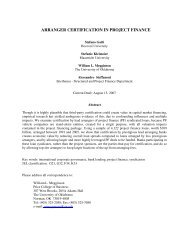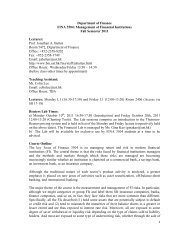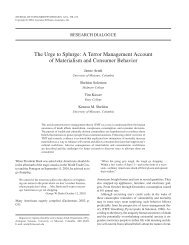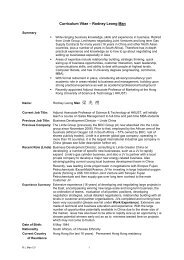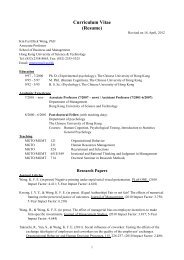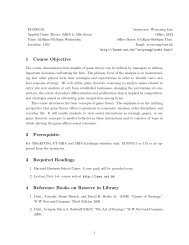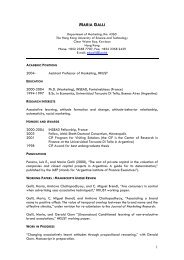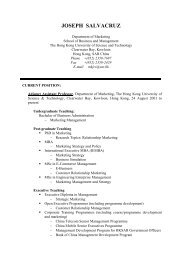Robert S. Wyer, Jr. EDUCATIONAL HISTORY - HKUST Business ...
Robert S. Wyer, Jr. EDUCATIONAL HISTORY - HKUST Business ...
Robert S. Wyer, Jr. EDUCATIONAL HISTORY - HKUST Business ...
You also want an ePaper? Increase the reach of your titles
YUMPU automatically turns print PDFs into web optimized ePapers that Google loves.
<strong>Robert</strong> 18 S. <strong>Wyer</strong><br />
Wanke, M. & <strong>Wyer</strong>, R. S. (1996). Individual differences in person memory: The role of sociopolitical<br />
ideology and in-group versus out-group membership in responses to socially relevant behavior.<br />
Personality and Social Psychology Bulletin, 22, 742-754.<br />
1997<br />
Seidlitz, L., <strong>Wyer</strong>, R. S. & Diener, E. (1997). Cognitive correlates of subjective well-being: The<br />
processing of valenced life events by happy and unhappy persons. Journal of Research in<br />
Personality, 31, 240-256.<br />
Swan, S. & <strong>Wyer</strong>, R. S. (1997). Gender stereotypes and social identity: How being in the minority<br />
affects judgments of self and others. Personality and Social Psychology Bulletin, 23, 1265-1276<br />
Radvansky, G. A., <strong>Wyer</strong>, R. S., Curiel, J. M., & Lutz, M. F. (1997). Situational models and abstract<br />
ownership relations. Journal of Experimental Psychology: Learning, Memory and Cognition, 23,<br />
1233-1246.<br />
1998<br />
Mankowski, E. & <strong>Wyer</strong>, R. S. (1998). Cognitive causes and consequences of perceived social support.<br />
In G. R. Pierce, et al. Sourcebook of Theory and Research in Social Support and Personality (p.<br />
141-168. Plenum.<br />
Isbell, L., Smith, H. & <strong>Wyer</strong>, R. S. (1998). The influence of cognitive and affective factors on intentional<br />
disregarding. In J. Golding & C. MacLeod (Eds.) Intentional forgetting: Interdisciplinary<br />
approaches. Mahwah, NJ: Erlbaum.<br />
Shrum, L. J., <strong>Wyer</strong>, R. S., & O'Guinn, T. (1998). The effects of watching television on perceptions of<br />
social reality. Journal of Consumer Research, 24, 447-458.<br />
Adaval, R. & <strong>Wyer</strong>, R. S. (1998). The role of narratives in social information processing. Journal of<br />
Consumer Psychology, 7, 207-245<br />
Reid, L., & <strong>Wyer</strong>, R.S. (1998). Stereotype suppression in a social context. In R.S. <strong>Wyer</strong>, (Ed.)<br />
Stereotype activation and inhibition: Advances in social cognition. (Vol. 11, pp. 177-192),<br />
Mahwah, NJ: Erlbaum.<br />
1999<br />
<strong>Wyer</strong>, R. S., & Radvansky, G. A. (1999). The comprehension and validation of social information.<br />
Psychological Review, 106, 89-118.<br />
Isbell, L. M., & <strong>Wyer</strong>, R. S. (1999). Correcting for mood-induced bias in the evaluation of political<br />
candidates: The roles of intrinsic and extrinsic motivation .Personality and Social Psychology<br />
Bulletin, 25, 237-249.<br />
<strong>Wyer</strong>, R. S., Clore, G. L., & Isbell, L. M. (1999). Affect and information processing. In M. P. Zanna (Ed.),<br />
Advances in experimental social psychology (Vol. 31, pp. 1-77). San Diego, CA:<br />
Academic Press.<br />
2000<br />
18




